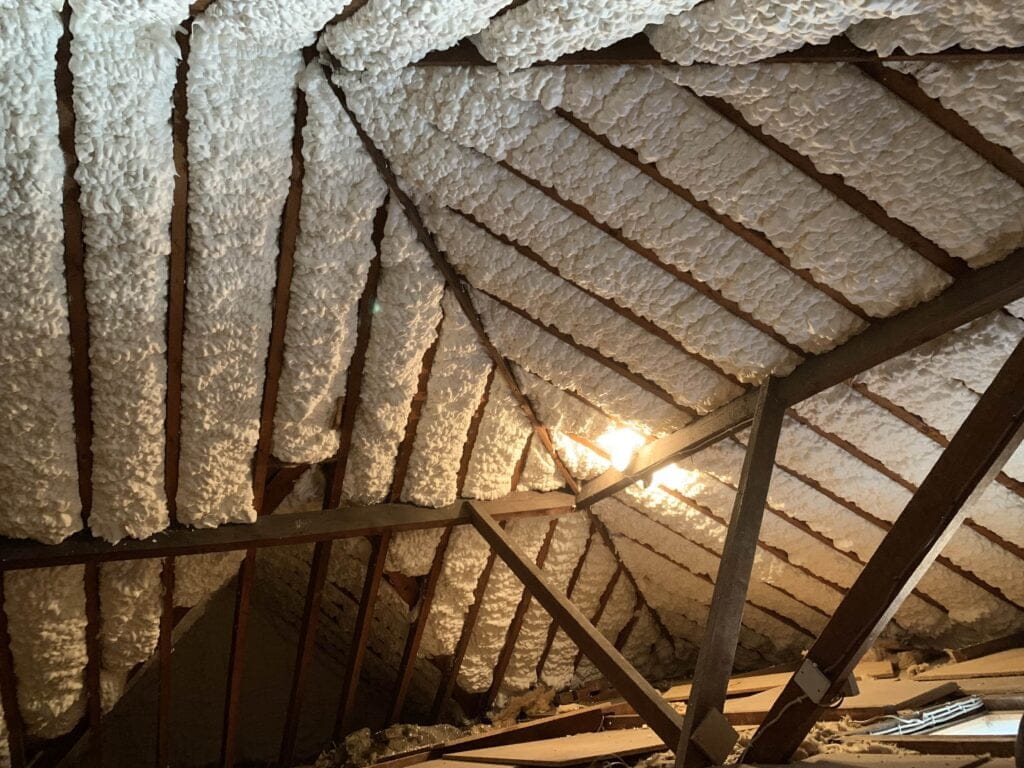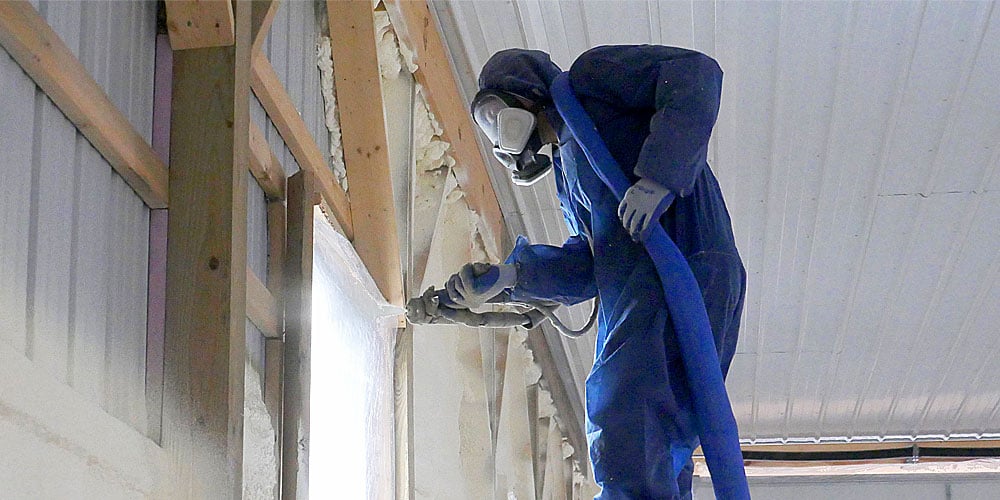Tips for Maintaining Your Spray Foam Insulation for Long-Term Performance
Tips for Maintaining Your Spray Foam Insulation for Long-Term Performance
Blog Article
Spray Foam: The Ultimate Service for Air Sealing and Insulation
Spray foam insulation has actually arised as a leading service for efficient air sealing and thermal insulation, offering an one-of-a-kind mix of residential properties that establish it apart from conventional methods. Understanding the complete range of its benefits, installation procedures, and comparisons with other insulation kinds is vital for making notified decisions.
What Is Spray Foam?
Spray foam is a versatile insulation product that integrates the principles of air securing and thermal resistance to improve energy performance in buildings. Made up mostly of polyurethane or other comparable substances, spray foam is applied as a fluid that broadens upon call with surface areas, creating a strong, continuous layer of insulation. This one-of-a-kind property enables it to fill voids, cracks, and gaps that standard insulation products may overlook, supplying a superior air seal.
There are 2 main kinds of spray foam: open-cell and closed-cell. Open-cell spray foam is lighter and much more adaptable, providing superb noise absorption and a reduced R-value per inch - Spray Foam. In contrast, closed-cell spray foam is denser, giving a higher R-value, dampness resistance, and included architectural stability to constructing components
The application procedure generally entails specialized devices, ensuring a seamless application that follows various substrates, consisting of timber, metal, and concrete. This adaptability makes spray foam appropriate for both new constructions and retrofitting existing structures. Its ability to create an airtight barrier considerably adds to minimizing energy intake and improving indoor air high quality, therefore making it a favored choice among contractors and home owners alike.
Advantages of Spray Foam Insulation
One of the most significant advantages of spray foam insulation is its outstanding capacity to develop a continual air obstacle, which effectively minimizes energy loss. Unlike conventional insulation materials, spray foam expands to fill gaps and cracks, guaranteeing that air leakage is substantially reduced. This characteristic not just boosts power effectiveness however likewise results in lower utility bills with time.
In addition, spray foam insulation gives remarkable thermal resistance, adding to a much more stable interior setting. Its high R-value per inch enables for efficient insulation in confined rooms, making it excellent for attic rooms, walls, and crawl spaces. In addition, the moisture-resistant residential or commercial properties of spray foam help protect against mold and mildew and mildew development, advertising healthier living problems.
One more critical advantage of spray foam insulation is its sound-dampening qualities (Spray Foam). It properly minimizes noise transmission in between rooms, developing a quieter and much more comfy home environment. The durability of spray foam likewise stands out, as it does not droop or settle with time, maintaining its efficiency throughout its lifespan
Exactly How Spray Foam Functions
Comprehending just how spray foam insulation works is crucial for valuing its efficiency in air sealing and thermal resistance. Spray foam insulation includes two primary elements: isocyanate and polyol resin. When these elements are mixed, they go through a chemical reaction that causes the product to increase rapidly, producing a dense foam that fills cracks, voids, and cavities.
As the foam expands, it complies with surface areas, developing a closed seal that dramatically decreases air infiltration. This characteristic makes spray foam insulation very efficient at preventing drafts and moisture infiltration, which can lead to energy loss and damages over time. Furthermore, the closed-cell version of spray foam supplies superior thermal resistance due to its stiff structure, properly minimizing heat transfer.
The unique buildings of spray foam allow it to comply with irregular surface areas, guaranteeing extensive protection and a seamless barrier. Therefore, spray foam insulation not only enhances energy efficiency yet additionally adds to boosted indoor air quality by reducing the buildup of irritants and pollutants. Inevitably, recognizing the mechanics behind spray foam underscores its function as a remarkable choice for insulation and air securing in both commercial and residential applications.
Installment Process Review

Before installment, the room needs to be properly cleaned and prepped, making certain that surfaces are without particles, dampness, and dirt. like it This action is crucial due to the fact that contaminants can jeopardize adhesion and total performance. As soon as the area is prepared, the application entails mixing the 2 components of the spray foam, which expands upon call and fills up voids efficiently.
Educated specialists need to conduct the setup, utilizing specialized devices to make sure consistent insurance coverage and ideal thickness. Safety preventative measures, consisting of using safety equipment and making sure correct ventilation, are critical throughout this process. After application, the foam generally cures quickly, forming a solid barrier that improves energy effectiveness.
Contrasting Spray Foam to Traditional Insulation
When assessing insulation alternatives, spray foam insulation stands out in comparison to conventional products such as fiberglass and cellulose. Unlike fiberglass and cellulose, which can allow air seepage, spray foam expands upon application, filling up holes and voids to develop an airtight seal.
In addition, spray foam offers a higher R-value per inch than conventional insulation types, using more effective thermal resistance in a thinner profile. This particular is particularly useful precede with restricted tooth cavity depth. Spray foam is immune to moisture and mold and mildew development, which can be a substantial worry with cellulose and fiberglass, specifically in damp environments.
Nevertheless, spray foam insulation commonly brings a greater in advance expense than its conventional equivalents. Home owners must weigh this initial investment versus lasting power financial savings and efficiency advantages. Ultimately, while both insulation kinds serve their function, spray foam arises as an advanced remedy for modern-day insulation requirements, especially in terms of air securing and thermal click to find out more performance.

Final Thought
In recap, spray foam insulation stands for a very reliable option for attaining optimum air sealing and thermal resistance. Its distinct properties, consisting of wetness resistance and noise dampening, make it appropriate for various applications in both new buildings and retrofitting tasks (Spray Foam). The her response initial costs might be higher compared to standard insulation products, the long-term advantages, such as significant power financial savings and enhanced interior air top quality, validate the financial investment and emphasize its worth in modern building techniques.
Spray foam insulation has arised as a leading remedy for reliable air sealing and thermal insulation, offering an one-of-a-kind mix of buildings that establish it apart from standard approaches.Spray foam is a flexible insulation material that integrates the principles of air securing and thermal resistance to boost power efficiency in buildings.When evaluating insulation choices, spray foam insulation stands out in contrast to standard products such as fiberglass and cellulose. Eventually, while both insulation kinds serve their function, spray foam arises as an extra innovative option for modern insulation needs, especially in terms of air securing and thermal effectiveness.
In recap, spray foam insulation represents a highly reliable remedy for accomplishing optimal air securing and thermal resistance.
Report this page